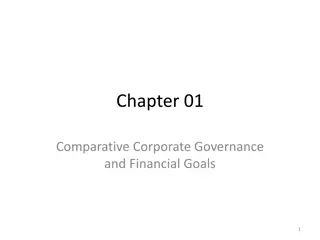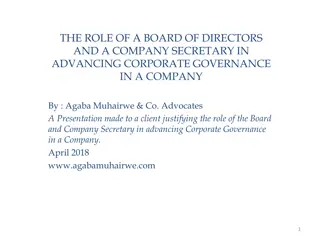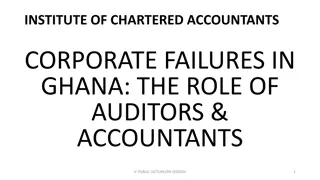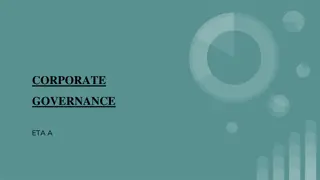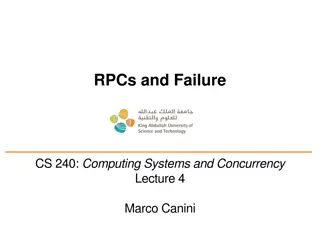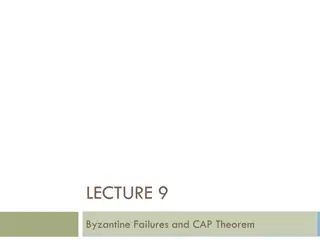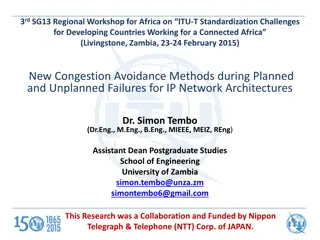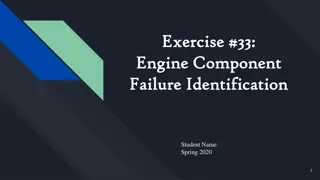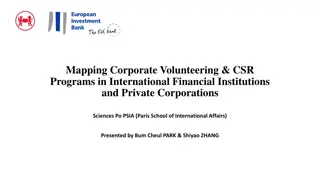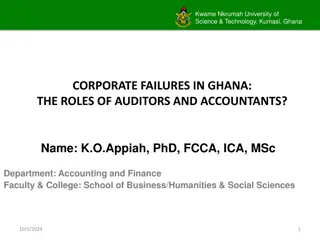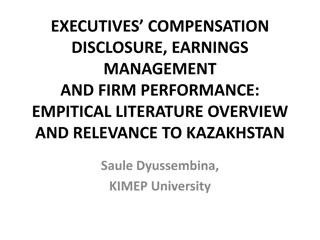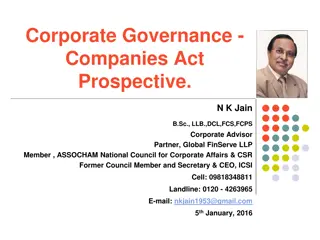Corporate Governance Failures and Best Practices in Financial Institutions
Explore the repercussions of poor corporate governance through case studies of Hindu Credit Union, CLICO, and Stanford International Bank, highlighting the critical importance of regulatory oversight, board effectiveness, and risk management. Learn the fundamentals of corporate governance and discover key takeaways to enhance governance standards in financial organizations.
Download Presentation

Please find below an Image/Link to download the presentation.
The content on the website is provided AS IS for your information and personal use only. It may not be sold, licensed, or shared on other websites without obtaining consent from the author.If you encounter any issues during the download, it is possible that the publisher has removed the file from their server.
You are allowed to download the files provided on this website for personal or commercial use, subject to the condition that they are used lawfully. All files are the property of their respective owners.
The content on the website is provided AS IS for your information and personal use only. It may not be sold, licensed, or shared on other websites without obtaining consent from the author.
E N D
Presentation Transcript
CEO Round Table Innovation, Integration, NextGen Leadership
Session Type: Corporate Governance/Business Continuity
Session Title: Corporate Governance Standards and its Optimality to realize its Benefits By: Morvin Williams (Antigua and Barbuda) Date: 17 June 2022 Venue: CCCU Convention - Jamaica
Outline of Presentation Governance Failure in a Credit Union Other Notable Governance Failures What is Corporate Governance The Importance of Corporate Governance The Fundamentals of Corporate Governance Fundamentals of Good Boards Effective Committees Effective Management Fundamentals of a Regulatory and Supervisory Oversight of the Governance Function Key Constructs/Takeaways
Governance Failure in a Credit Union Hindu Credit Union Co-operative Society Ltd Trinidad and Tobago 2014 Commissioner of Inquiry Report noted: The generally poor level of corporate governance at HCU was a major contributor to its failure Poor corporate governance [was] further illustrated by the various related party transactions Failing to improve corporate governance with regard particularly to the operations of the BOD and the credit control Failing to investigate and governance to ascertain whether it complied with the requirements under the Regulations and the Bye-Laws monitor corporate HCU s CS Act 1971, the Statutory
Other Notable Governance Failures CLICO Trinidad and Tobago Wayne Soverall (2012) The CLICO case illustrates that poor corporate governance, weak risk management practices, and inadequate management information systems were also major contributing factors that led to the collapse of CLICO Some of the deficiencies in the corporate governance structure of CLICO included too much control by the chairman who was also the chief executive officer Failure of the directors fiduciary duties Failure of the directors duty of care and skill Conflicts of interest Stanford International Bank Ltd Antigua and Barbuda
What is Corporate Governance Corporate governance is the system by which companies are directed and controlled. (The Institute of Chartered Accountants in England and Wales, 2022) Chart Source: https://www.oncopeptides.com/
What Cont d is Corporate Governance Particular emphasis is place on accountability, integrity and risk management transparency and accountability within existing systems. Source https://www.icaew.com/ good governance . is fundamentally about improving
Importance of Corporate Governance Corporate governance for credit union is of great importance given their crucial financial intermediation roles in an economy Some credit unions have become systemically important Weak governance can undermine public confidence in a credit union as well as the financial system in which it operates Directors, committee members and management are required to promote success of the credit union in the interest of members At best there ought to exist a Corporate Governance framework/manual. Framework must be made available to all members. Framework should facilitate and protect the rights of all members. Governance framework should ensure the equitable treatment of all members.
Building Good Boards
Building a Board of Directors: General Overview The Board plays a critical role in the successful operation of a credit union. Remember the old adage regarding what happens if the top is slack The Board is chiefly responsible for setting corporate strategy, reviewing managerial performance and maximizing returns for members at an acceptable level of risk The Board has a core responsibility for formulating sound and prudent policies and practices within the credit union The responsibility Board remains accountable and cannot nullify its overall
Building a Board of Directors: General Overview Cont d Building a more effective board is a process The role of a board of directors has evolved over the years The board s knowledge base should help set the tone for big-picture decision making in a credit union Boards are really at their best when they're providing guidance and leadership and insight at a higher level in the credit union - "The buck ultimately stops with the board"
Building a Board of Directors: Filling the Board Finding the right people to fill the board is the most crucial part of the process and can often be the most difficult for credit unions Seek to ensure you understand the credit union and the sector so they can think strategically Focus on people who understand sort of the nuts and bolts, the operations and finances of the credit union Incorporate young and/or dynamic talent have people who
Building a Board of Directors: Conduct Effective Meetings Ensure material to be discussed is presented in a timely manner Meetings should be balanced in terms of discussions seeking to avoid power grabs and domineering members Meeting should not be a case of rubber- stamping or else the board may well not exist at all Corporate records of sufficiently detailed meetings must be
The chairperson of the board of directors should be a leader with: Vision and problem solving skills The ability to motivate Business acumen
Barriers to Board Effectiveness Temptation to micro-management the board must avoid the temptation to micro- manage or intrude in lesser matters or in areas that are more appropriately handled by the management team within the credit union Unproductive Members People commitments as board members become major blocks to overall board effectiveness who are not carrying out their
Barriers to Board Effectiveness Cont d Absence of a strategic plan The lack of a strategic plan, in most cases, will also lead to poor board performance The lack of a formal plan of board training and education to continually upgrade the level of board skills and knowledge Lack of functioning committees structure Non functioning of committees can lead to poor performance in general
Barriers to Board Effectiveness Cont d No plan for orientation of new and old members Often absent is a plan for the blending of new and old board members functioning team into a well- The lack of a formal plan of board training and education to continually upgrade the level of board skills and knowledge.
Barriers to Board Effectiveness Cont d Things to consider including in your board orientation: Principal pieces of statutes governing the institution Credit Union s mission and vision statements Organizational history Bylaws and policies Strategic plan Corporate governance framework Financial summaries Board information Committee information Meeting processes
Having Effective Committees Prospective nomination stage effectiveness starts at the Expected standards are similar in many regard as in the case of the board Members should be conversant with the area on which they are serving Its is not a business of rubber stamping
Having Effective Management Actively monitors execution of Board approved strategies, plans, policies, etc for effective implementation Ensure there is segregation of duty both at management and line staff. helps to deter errors and irregularities can reduce the risk of internal fraud Roles and responsibilities must be transparent Avoid micro management Management should keep the Board of Directors and Committees fully appraised on a timely basis
How do regulators Measures the Effectiveness of Governance Risk Based Supervision currently forms part of the regulatory and supervisory process globally The effectiveness of the Board of a credit union is a basic tenet of a risk-based supervisory approach Assessing Corporate Oversight and Governance Operational Management,
How do Regulators Measures the Effectiveness of Governance Cont d As part of both the on and offsite supervisory process reviews are done of the corporate records Factors assessed via the minutes include: Existence of a charter Whether membership of the Committee is appropriate to the charter Frequency of meeting in line with charter or purpose Whether minutes are prepared in a timely manner
How do Regulators Measures the Effectiveness of Governance Cont d As part of both the on and offsite supervisory process reviews are done of the corporate records Factors assessed via the minutes include: Issues discussed in line with charter or purpose Minutes evidence balanced discussion Potential conflict of interest declared Decisions requiring board approval are escalated to the Board Overall rating is then accorded to the governance area that was reviewed
Governance Standards Ratings The following core standard rating categories are used to assess the Corporate Oversight and Governance functions: Strong Characteristics of the function meet or exceed what is considered necessary for the nature, scope, complexity and risk profile of the credit union, and the function has demonstrated highly effective consistent basis performance on a Acceptable Characteristics of the function meet what is considered necessary for the nature, scope, complexity and risk profile of the credit union, demonstrated effective and the function has performance
Governance Standards Ratings Cont d The following standard rating categories are used to assess the Corporate Oversight and Governance functions: Needs Improvement Characteristics of the function generally meet what is considered necessary for the nature, scope, complexity and risk profile of the credit union; but, there are some significant areas that require improvement. Performance has generally been effective; but, there are some significant areas where effectiveness needs to be improved. These areas are not likely to cause serious prudential concerns if addressed on a timely basis Weak Characteristics are not, in a material way, what is considered necessary given the nature, Scope, complexity and risk profile of the credit union. Performance has demonstrated serious instances where effectiveness needs to be improved through immediate action
Some Key Constructs/Takeaways Ensure you know the principal piece of legislation governing the sector, regulations, guidelines and the institution s own polices and procedures Board and Committee members are not being asked to be loans officers, CFOs, CFAs, CROs, Internal auditors and the like, but there understanding of these functions Board, committee members and management must become conversant of emerging issues that can potentially impact the Credit Union operations for instance climate change and cyber risk Recruit young talent Understand the macro environment in which the credit union operates must be some basic and micro economic
Thank You! Contact Details: Morvin Williams Tel. (268) 764 5815 Email. Morvin.Williams@fsrc.gov.ag Morvin.willliams@gmail.com




